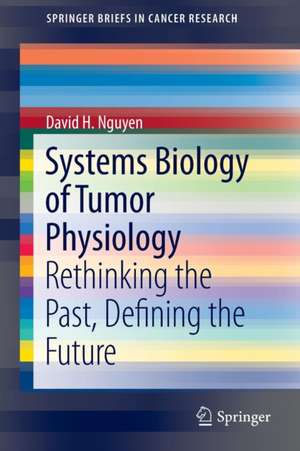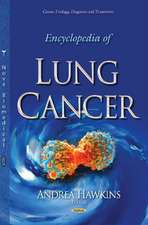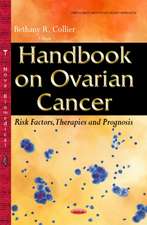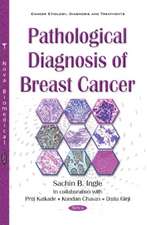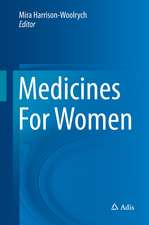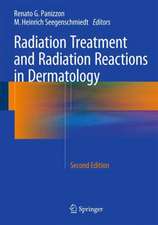Systems Biology of Tumor Physiology: Rethinking the Past, Defining the Future: SpringerBriefs in Cancer Research
Autor David H. Nguyenen Limba Engleză Paperback – 17 dec 2015
Preț: 356.46 lei
Preț vechi: 375.23 lei
-5% Nou
Puncte Express: 535
Preț estimativ în valută:
68.22€ • 70.62$ • 57.66£
68.22€ • 70.62$ • 57.66£
Carte tipărită la comandă
Livrare economică 05-19 martie
Preluare comenzi: 021 569.72.76
Specificații
ISBN-13: 9783319255996
ISBN-10: 3319255991
Pagini: 56
Ilustrații: XIII, 56 p.
Dimensiuni: 155 x 235 x 4 mm
Greutate: 0.11 kg
Ediția:1st ed. 2016
Editura: Springer International Publishing
Colecția Springer
Seria SpringerBriefs in Cancer Research
Locul publicării:Cham, Switzerland
ISBN-10: 3319255991
Pagini: 56
Ilustrații: XIII, 56 p.
Dimensiuni: 155 x 235 x 4 mm
Greutate: 0.11 kg
Ediția:1st ed. 2016
Editura: Springer International Publishing
Colecția Springer
Seria SpringerBriefs in Cancer Research
Locul publicării:Cham, Switzerland
Public țintă
ResearchNotă biografică
David H. Nguyen, Ph.D., received the Department of Defense Pre-Doctoral Fellowship in Breast Cancer Research while conducting doctoral research at the University of California-Berkeley and Lawrence Berkeley National Laboratory. He then did post-doctoral research jointly between New York University and Lawrence Berkeley National Laboratory. He is a lecturer for the Integrated Science Program that is part of Southern California University of Health Sciences. He is also the founding editor-in-chief of Cancer InCytes Magazine. His research interests are the hormonal, immune, and epigenetic mechanisms behind why childhood trauma correlates with an increased risk of cancer during adulthood.
Textul de pe ultima copertă
This exciting SpringerBrief presents evidence for new ideas that will challenge several theories of how cancer biology is understood. Cancer biology has undergone several intellectual revolutions in the past 50 years. A mutation-centric view of cancer has given way to the tumor microenvironment view. Reductionistic studies of one gene at a time have given way to systems biology approaches that analyze the whole genome (omics) at the same time. However, this text combines the complex levels studying cancer at the molecular biology level, endocrinology level, and transcriptomics level. What researchers are now realizing is that there is a need to combine omics with physiology concepts in order to better understand cancer and this book will give insight to the merging of these two fields in order to define how cancer is studied in the future.
Caracteristici
Discusses 'cell origin' versus 'plasticity' hypothesis in cancer
Explores how to use mouse models in cancer research
Provides a unique perspective by merging physiology and system biology view of breast cancer
Includes supplementary material: sn.pub/extras
Explores how to use mouse models in cancer research
Provides a unique perspective by merging physiology and system biology view of breast cancer
Includes supplementary material: sn.pub/extras
